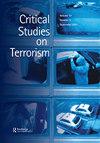Pastels and Pedophiles: Inside the mind of QAnon
IF 2.5
Q2 POLITICAL SCIENCE
引用次数: 8
Abstract
in an oversimplification that fails to consider the differing intellectual, experiential, and ideological roots of different forms (379). Saudi-Indonesia bilateral relations, especially co-operation on counterterrorism strategies and programmes, are discussed in Chapter 10. This bilateral cooperation began in 2014, when the Defense Cooperation Agreement (DCA) was signed between Indonesia and Saudi Arabia, and other Middle Eastern countries. The DCA covers training, education, counterterrorism, and defence industry cooperation. Signed by Saudi Deputy Defense Minister Prince Salman bin Sultan Al Saud and Indonesian Deputy Minister of Defense Sjafrie Sjamsoeddin, it is arguably the first agreement of its sort (397). Overall, the book argues that collaboration on combating terrorism is important for both countries and fruitful for both sides. For Indonesia, where counterterrorism lessons can be learned, many issues lie in the actions of the central government, the societal factors that have enabled it, and the precarious state of “success” against terrorism. As for Saudi Arabia, the ruling family has been central in orchestrating changes in public sectors and fighting terrorism by reforming the government bureaucracy, cutting its connection with religious radical factions, and replacing the religious conservatives with moderates in religious, cultural, and educational institutions (409). This book is recommended for those who would like to understand better the struggles over counterterrorism in Saudi Arabia and Indonesia. It may serve as a starting point for those seeking to prevent and overcome terrorism in other parts of the world and broaden readers’ perspectives on the similarities and differences in two Muslim majority countries and the lessons that can be taken from their experiences. The key contribution lies in its comparative approach, with a focus primarily on Islamist terrorism, although other forms of terrorism are also discussed. Al Qurtuby provides a critical assessment for academic and non-academic communities alike, in a field that has overstated and dramatised the central role and contributions of ideology as the locomotive of the Islamist terrorism carriage without sufficiently considering the plurality of agency (terrorist actors) and the multiple complex roots of terrorism and violent extremism.粉彩与恋童癖:QAnon的内心世界
在一种没有考虑不同形式的不同的智力、经验和意识形态根源的过度简化中(379)。沙特与印度尼西亚的双边关系,特别是在反恐战略和方案方面的合作,将在第10章讨论。这种双边合作始于2014年,当时印度尼西亚与沙特阿拉伯以及其他中东国家签署了《防务合作协议》(DCA)。DCA涵盖培训、教育、反恐和国防工业合作。由沙特国防部副部长萨勒曼亲王和印度尼西亚国防部副部长Sjafrie Sjamsoeddin签署,这可以说是第一个此类协议(397)。总的来说,这本书认为合作打击恐怖主义对两国都很重要,对双方都很有成效。对于可以学习反恐经验的印度尼西亚来说,许多问题在于中央政府的行动、使其得以实施的社会因素以及反恐“成功”的不稳定状态。至于沙特阿拉伯,统治家族通过改革政府官僚机构,切断与宗教激进派别的联系,用宗教、文化和教育机构中的温和派取代宗教保守派,在公共部门的改革和打击恐怖主义方面发挥了核心作用(409)。这本书推荐给那些想更好地了解沙特阿拉伯和印度尼西亚反恐斗争的人。对于那些寻求在世界其他地区预防和克服恐怖主义的人来说,这本书可以作为一个起点,并拓宽读者对两个穆斯林占多数的国家之间的异同以及可以从他们的经历中吸取教训的视角。该书的主要贡献在于其比较方法,主要关注伊斯兰恐怖主义,尽管也讨论了其他形式的恐怖主义。Al quurtuby为学术界和非学术界提供了一个批判性的评估,在这个领域,意识形态作为伊斯兰恐怖主义的火车头被夸大和戏剧化了,而没有充分考虑到机构(恐怖分子)的多元性以及恐怖主义和暴力极端主义的多重复杂根源。
本文章由计算机程序翻译,如有差异,请以英文原文为准。
求助全文
约1分钟内获得全文
求助全文

 求助内容:
求助内容: 应助结果提醒方式:
应助结果提醒方式:


